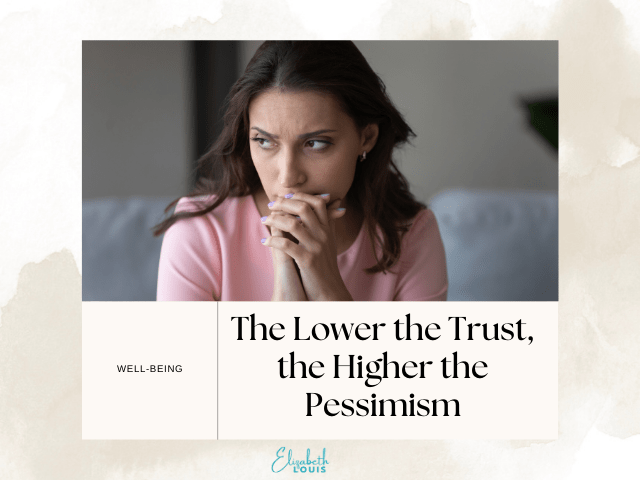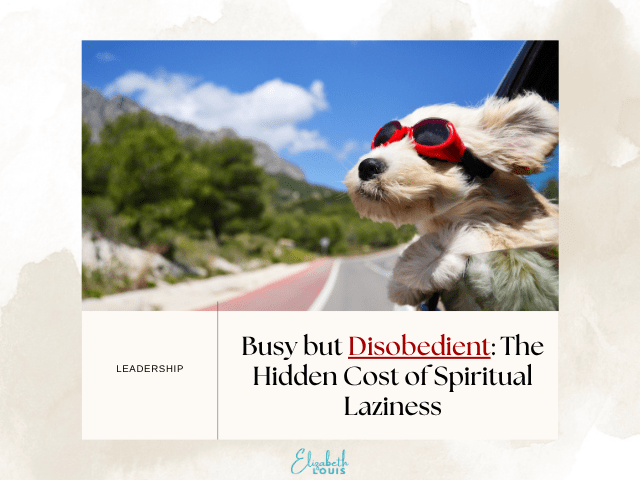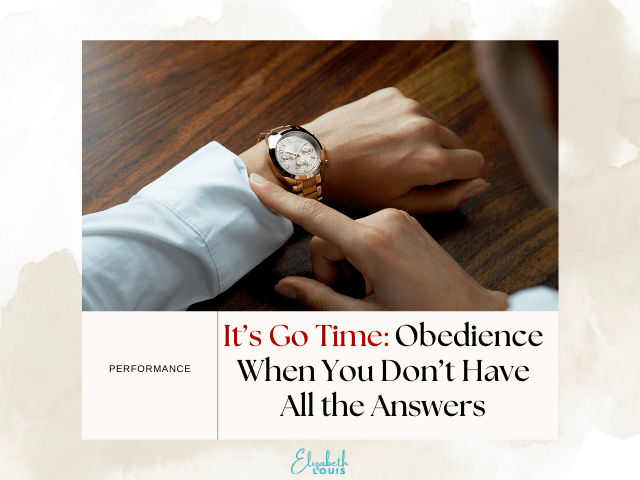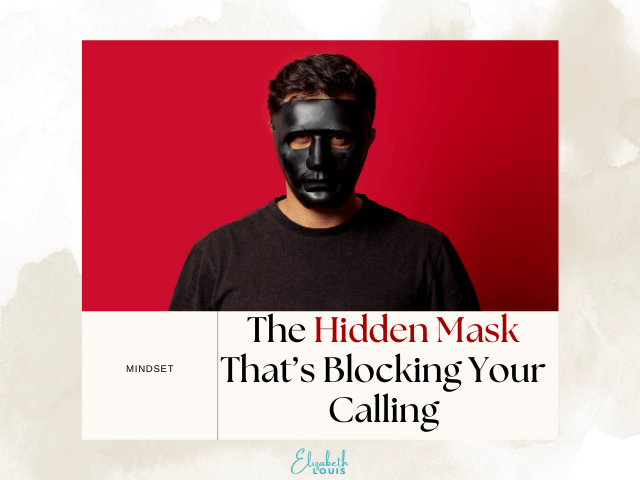
By: Elizabeth Louis
Let’s talk about trust…
How easy is it for you to trust other people on a one (1=0%) to ten scale (10=100%)?
If you are a bit more analytical and need to understand the trust scale, consider this…
HIGH TRUST (10): is an exceptionally trusting person who readily accepts people for who they are. It’s not in their nature to question the motivation of others.
LOW TRUST (1): is a suspicious person who questions others’ motives, always on guard, defensive, and believes others are against them.
What number would you say you are?
Did you know trust and optimism are linked?
The easier it is for you to trust, the more optimistic you are. Similarly, the harder it is for you to trust, the more pessimistic you are.
As someone who was once mentally tortured by pessimism, self-doubt, inferiority, and negative core beliefs, I find being optimistic way easier and less stressful.
The Pessimistic and Low Trust Correlation
UGH! Someone has hurt you… in the past, which has influenced you to develop the deep-rooted belief that people are against you and you can’t trust anyone. Have you been here?
To be blunt, get in line. Who hasn’t been betrayed or victimized?
But why hold on to it?
Why let them have the power to hurt you even more by taking away an optimistic perspective from you?
Being victimized can significantly hinder your belief in humanity. It’s easy to transfer your victimization to everyone — believing everyone will ultimately hurt or screw you over.
When someone has been victimized, it’s easy to allow them to take more than they initially wanted, but you don’t have to give them anything or let their actions impact you.
Consider this: They hurt you. That stinks. But what if you took a proactive approach and recognized the power within your control instead of allowing it to freeze you in time and make you feel helpless and stuck in life?
What’s in your control, you ask? Great question!
How you perceive the situation. How you respond or react. Ultimately, you can only control you.
Choose to perceive the situation where someone broke your trust in a more positive, hopeful, and optimistic light. Also, consider responding to the breach in the relationship instead of reacting. Usually, the breach of trust has less to do with you and more with the person who broke your trust.
For instance, an optimist might say, “Well, that stinks, but I believe this was the exception to the rule. I am trusting God to redeem this. I know that by learning from this situation and applying those learnings, I won’t fall prey to this situation again.”
Ultimately, be thankful that you learned and will be more strategic with your approach moving forward.
Optimists believe that in time, they’ll be successful and achieve their goals through hard work and improving their applied effort.
But What If You Can’t Shake That Foolish Feeling…
Maybe someone proved to be untrusting, and now you feel like a fool. I get it. I have been there too. But let’s take a step back. Let’s challenge this belief or feeling.
Do you truly consider yourself foolish for placing trust in someone when, at the time of trusting them, you had no reason to doubt them?
Remember, trusting a person shows your strength and positive attributes.
Someone who proves themselves to be untrustworthy is not your problem but theirs. Of course, be more mindful of this truth moving forward, especially when dealing with that person, similar personality traits in others, or situations that are similar.
You can learn from it, but don’t let it get to the point where you become paranoid. Just because one person did this to you does not mean everyone else will. Be mindful of any all-or-nothing thoughts, magnifying thoughts, overgeneralization thoughts, or any other thinking trap tendencies you may fall prey to.
The battle is in the mind here. Self-talk will be the key to overcoming this, especially when your self-talk partners with positive, faith-filled thinking.
Take the Thinking Trap Quiz to Learn Which Thinking Traps are Hindering You.
In fact, this is the power of partnering with Jesus Christ. He will redeem all things to work for the greater good (Romans 8:28). Trust Him to redeem what was lost in His time… Not yours.
Let It Go…
Over the decade of working with people as their coach, I have learned that many people get hurt by someone and never forgive that person. Instead, they over-personalize it (another thinking trap) and then transfer that experience to everyone they interact with.
Doom-and-gloom thinking around trusting a person circulates in their mind. They give power to the dominating thought, “I CAN’T TRUST ANYONE!”
But is that really true or extremely dramatic?
Personally, I am going to say it’s extremely dramatic. I understand why. No Judgments. You’re hurt and trying to protect yourself, but let’s be honest here.
I am sure there are people you trust.
In fact, if you’re struggling to trust people, list the people you trust and focus on these individuals more than those who have hurt you. At some point, you must stop feeding the dominant thought and perspective that says, “I CAN’T TRUST PEOPLE!”
Lastly, what if you forgive them and believe that great things are coming?
The truth is we all hurt others. Some more than others. Some grow in wisdom and become more intentional with their agreements, choices, and wording.
But consider this…
Why does the person who hurt you get to hurt you more by taking away a hope-filled perspective about your future?
The truth is you have power over what they take from you.
Don’t let them have more power than they already do! Choose to see that there are more trustworthy than untrustworthy people worldwide. Be wise and strategic regarding whom you trust, too. Learning the skills of wisdom and discernment is important so you will stop being a fool.
The Victim Mentality is the Real Issue
In short, the low-trust person has developed a touch of the Victim or helpless mentality and greatly struggles with bitterness. (Bitterness will destroy your life quickly!) The severity of this mentality will depend on other traits like low self-confidence, conscientiousness, responsibility, coachability, composure, etc.
But isn’t that also a very limited and depressing perspective?
No, not every human on earth should, needs, or can be trusted. I also don’t think you can always tell who you can or can’t trust. Some people are wolves in sheep’s or sheepdog clothing, but instead of kicking yourself or getting butt hurt — learn from it and move on. Life will move forward anyway; I may as well join it.
Hold on to Hope
Personally, I don’t believe humans have the final say. I believe God has the final say. What do you believe?
I am a very intuitive person. It’s not hard for me to understand a person’s real motives. In all humility, it’s one of the gifts the Lord has blessed me with. However, I don’t believe I need to protect myself like some humans with low trust do. If someone takes advantage of me…okay, I will learn it from, but I’ll also trust God to redeem what was taken from me. I don’t blame myself, beat myself, or condemn myself. The devil wants that, and I do my best to obey God.
For instance, I will spend more time in prayer when I get played. I ask God to redeem it, and then I examine what steps or decisions I make that were solely in my control that may have aided in this person taking advantage of me.
I consider… Where did being impulsive or driven by fear blindside me? Where did I not trust my gut, and why? What was the lesson(s) I could learn from this?
If a person wants to lie to me or ultimately do something that would break my trust, I remember it’s not me; it’s them. Think about the type of person who breaks people’s trust. Think about how insecure, unhappy, and fear-filled they are. People who lie and have poor or no integrity are terrified of people and usually don’t like themselves. It takes self-hatred, self-rejection, self-bitterness, and deep-rooted weed of rejection to break people’s trust and intentionally hurt a person.
I can’t control how honest and trustworthy a person is or isn’t. I can only focus on what’s in my control, which ultimately comes down to me and only me. Likewise, I can trust God and myself. However, I refuse to let one person ruin my trust in all of humanity because (1) that’s transference at its finest, (2) I know more trustworthy people than untrustworthy people, and (3) lastly, I refuse to hurt myself worse all because someone’s not doing what I want them todo.
People Problems
I know people are going to hurt me. It’s a fact of life. Just like I’m going to hurt people too. I don’t want to, and I hope it’s never intentional, either. Nonetheless, I know it will happen.
If you have people in your life, you will have people problems, but that’s not a bad thing. A life without people is lonely and miserable. Humans were designed for connection and community, not isolation.
I choose to separate the sin from the person. If I disagree with the thought, “I can’t trust people,” then it has no power over me. You see, you have a choice. You can let one or a few experiences define your perspective in life, or you can hold on to hope.
The Power of Choosing to Trust
Here’s the real problem with low trust: it causes you to be pessimistic. I know you may be thinking, I’m not pessimistic. I am a realist. Okay, that’s realistically another way of saying pessimism. Optimism and pessimism are binary. Now, a lot of people get optimism and idealism confused when they aren’t the same. That’s a different story.
What if I told you that optimistic people get more opportunities than pessimistic? Would that encourage you to think twice about your relationship with this deep-rooted belief that people are against you?
Check out some of the awesome benefits of working on your trust score and developing an optimistic view.
The Opportunity of an Optimist:
- See setbacks and defeats as temporary.
- Unfazed by defeat
- Difficult situations are challenges to them
- Focus on their effort and leverage the Growth Mindset
- Live longer
- See misfortunes as part of life, a result of other people’s sin, and bad luck, which happens
- Can raise your level of achievement
- Protect against depression
- Enhance your physical well-being
Now consider the alternative.
The Pain of Pessimism:
- Neuroscience has proven that humans work to create their most dominant thoughts. The defining characteristic of a pessimist is that they tend to visualize bad events that will happen and last longer than necessary.
- Difficulty causes them to be irritable, procrastinate, give up, and be overly frustrated.
- Give up more easily
- Depressed more often
- Pessimistic and fear-based prophecies are self-fulfilling
- Believes misfortunes are directly the pessimist’s fault
- Turn setbacks into disasters (Catastrophizing & Magnifying)
If you have low trust and would like to work on this trait, I encourage you to apply to work with me in a 1:1 setting or stay alert for LIZ’S OPTIMISM BOOTCAMP Challenge!
In the meantime, check out this episode on THE LIZ SHOW: How to Create Psychological Safety
Check it Out on: Spotify | Apple Podcast | Direct Download
You got this. Keep up the good work. I believe GREATLY in you!
Liz



